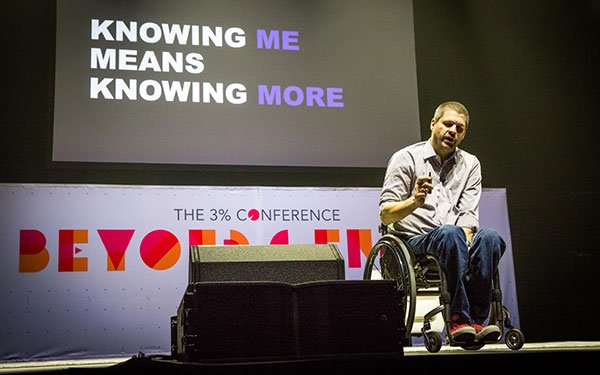
Ignorance within the ad industry isn't innocence, but we
should all feel empowered to ask questions, said JWT's Torsten Gross during the 3% Conference today in New York City. "Let's embrace the elephant."
Gross, who has been a quadriplegic since an
accident 23 years ago, said he now "represents the smallest minority" in the ad industry. "Why do I assume you know what life is like in a wheelchair?" he asks. We all have blind spots, which are
partly responsible for misfires that led to consumer backlash to ads from Pepsi, Nivea and Dove.
"We don't know how to ask questions anymore," says Gross, who joined BBDO's Andres Ordonez and
Campbell Ewald's Kari Shimmel to discuss assumptions and unconscious bias.
Panelists say the industry has been scared to ask questions to avoid offending others. When we draw that line about
what we can say and do, creativity becomes limited, they say.
advertisement
advertisement
"We are on the defensive," says Ordonez. "It puts you in a weird situation," he says.
There needs to be a place where it
is acceptable to ask uncomfortable questions. "They might not know, so let's not judge them," says Gross. "Let your curiosity out."
He mentioned an interview with an agency that he "nailed,"
but didn't receive a job offer because the hiring manager made assumptions without directly addressing her concerns. “Planners have to travel and work long-hours, and I didn't know if you could
as a disabled person,” she told him afterward.
We need to be allowed to talk about issues without discomfort. Now, he finds himself preemptively addressing potential concerns before he
is asked to ensure that managers know he can travel and work long days.
"It isn't about creating safe spaces, it is about creating brave spaces," says Shimmel. "There is freedom on the other
side of fear," adding we aren't going to make progress if we are all neutral.
Context matters. For instance, Gross would often say "hon" to women as an endearing greeting, yet others may find
that term demeaning.
“Whenever you feel offended, ask the question, ‘what do you mean by that?’” recommends Shimmel. "Know I am coming from a positive place. We are
afraid of that line."
“We have the responsibility to lead by example,” says Ordonez. “There are many situations that could have been fixed — if we had conversations
earlier,” he says. It is critical to take the first step by opening the conversation.
“If diversity and inclusion isn't deliberate, it won't happen,” adds Shimmel.